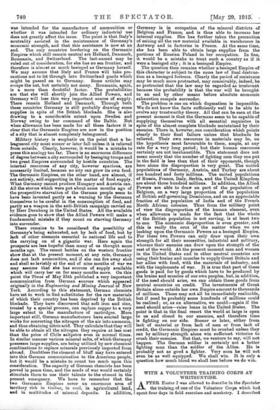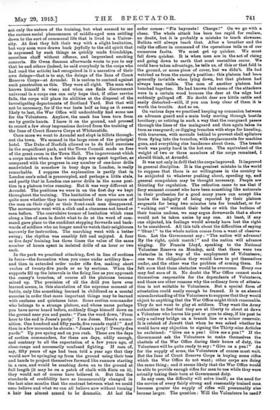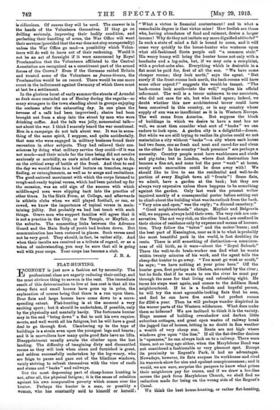WITH A VOLUNTEER TRAINING CORPS AT WHITSUNTIDE.
AFTER Easter I was allowed to describe hi the Spectator the training of one of the Volunteer Corps which had spent four days in field exercises and musketry. I desesibed
not only the nature of the training, but what seemed to me the curious social phenomenon of middle-aged men settling down to the sort of communal life that is lived in a Univer- sity. At first they felt their way with a slight hesitation, but very soon were drawn back joyfully to the old spirit that is expressed by such things as quickly made friendships, merciless chaff without offence, and improvised smoking concerts. Sir Owen Seaman afterwards wrote to you to say that he and others (indeed, he said everybody in the corps who had read the article) had recognized in it a narrative of their own doings—that is to say, the doings of the Inns of Court Reserve Corps—at Arundel. It is useless to contend against such penetration as this. They were all right. The man who knows himself is wise; and when one finds discernment universal in a corps one can only hope that, if other service fails, the corps will place its abilities at the disposal of the investigating departments of Scotland Yard. But that will not be necessary, for if the war lasts half as long as it seems likely to last, the War Office will undoubtedly find some use for the Volunteers. Anyhow, the mask has been torn from me by gentle hands. I leave it on the ground, and proceed to record a few stray impressions derived from the training of the Inns of Court Reserve Corps at Whitsuntide.
Once more we went to Arundel and slept in billets through- out the town. We messed in the large room of the principal hotel. The Duke of Norfolk allowed us to do field exercises in the magnificent park, and the Town Council made us free of the great room in the Town Hall. The improvement which a corps makes when a few whole days are spent together, as compared with the progress in any number of one-hour drills sandwiched in somehow in busy days in London, is really remarkable. I suppose the explanation is partly that in London one's mind is preoccupied, and perhaps a little stale, and partly that in London one never drills in the same posi- tion in a platoon twice running. But it was very different at Arundel. The positions we were in on the first day we kept throughout the training. The hesitation of men who are not quite sure whether they have remembered the appearance of the man on their right or their front-rank man disappeared. The movements went with a click and a cleanness not heard or seen before. The convulsive tremor of hesitation which runs along a line of men in doubt what to do at the word of com- mand gave place to the confident stepping forwards and back- wards of soldiers who no longer need to watch their neighbours narrowly for instruction. The marching went with a better swing; the rhythm was sensibly felt and enjoyed. A. four or five days' training has three times the value of the same number of hours spent in isolated drills of an hour or two each.
In the park we practised attacking, first in line of sections in fours—the formation when you come under artillery fire— and then in extended order under rifle fire, making short rushes of twenty-five yards or so by sections. When the supports fill up the intervals in the firing line as you approach the enemy's trenches, of course all the platoons become mixed up. The precision of all the drill you have ever learned seems, in this simulation of the supreme moment of battle, only like something learned in childhood as a mental exercise in order that more important things may be learned with coolness and quietness later. Some section commander who belongs to a strange platoon, and whose name perhaps you have never heard before, suddenly flings himself down on the ground near you and pants "Pass the word down, 'From here to the end is Jones's party.' I am Jones. Here's ammu- nition. One hundred and fifty yards, five rounds rapid !" And then in a few moments he shouts : " Jones's party! Twenty-flee yards." Up you spring and on you rush. These are the days of section commanders, for these are days, oddly enough, and contrary to all the expectation of a few years ago, of close-range and necessarily confused fighting. If men of, say, fifty yeses of age had been told a year ago that they would now be springing up from the ground using their toes and hands to project themselves forward like runners starting in a race, and would be crashing down on to the ground at full length (it may be on a patch of chalk with flints on it), they would not of course have believed it. But then the standards of credibility have so immeasurably changed in the last nine months that the contrast between what we could once believe and what we can all believe now without turning a hair has almost ceased to be dramatic. At last the order comes "Fix bayonets! Charge!" On we go with a cheer. The whole attack has been too rapid for realism, no doubt, but it is probably a mistake to teach slowness. Bullets will always teach that. After a breather and the rally the officer in command of the operations tells us of our numerous faults. We must get up quicker. We must fall down quicker. It is when men are in the act of rising and going down to earth that most easnaltiee occur. We could have taken advantage, be tells us, of this or that fold in the ground, or some piece of cover, but we didn't. He had watched us from the enemy's position: this platoon had been generally invisible when lying down, but that platoon had always been visible. The men of another platoon had hunched together. He had known that some of the attackers were in a certain wood because the deer at the edge had suddenly galloped of No doubt deer are kittle cattle and easily disturbed—still, if you can keep clear of them it is worth the trouble. And so on.
On various days we practised keeping up connexion between an advance guard and a main body moving through hostile territory; or retiring in such a way that the rearguard passes through the lines of the mainguard and then again takes its turn as rearguard; or digging trenches with steps for kneeling, with traverses, with mounds behind to prevent shell splinters from flying into the trenches, with emplacements for machine guns, and everything else handsome about them. The trench work was pretty hard in the hot sun. The equivalent of the weight of two or three members of the corps remained, I should think, at ArundeL
It was not only in drill that the corps improved. It improved in general discipline. It is the greatest mistake in the world to suppose that there is no willingness in the country to be subjected to whatever pushing about, speeding up, and general compulsion may be thought necessary. People are thirsting for regulation. The reflection came to me that if fiery eminent counsel who have been something like autocrats in their profession for a good many years can accept like lambs the indignity of being reported by their platoon sergeants for being two minutes late for breakfast, or for "walking out" without their belle or with the buttons of their tunics undone, we may argue downwards that a shove would not be taken amiss by any one. At least, if any one objected, his feelings would already have lost the right to be considered. All this talk about the difficulties of saying "'Shun!" to the whole nation comes from a want of observa- tion. Let the Government say " The nation will advance! By the right, quick march !" and the nation will advance singing. Sir Francis Lloyd, speaking to the National Volunteer Reserve on Monday, said that there were two obstacles in the way of the employment of Volunteers; one was the obligation they would have to put themselves under, and the other was the problem of arming them. He felt sure that these obstacles would be overcome. Every one may feel sure of it. No doubt the War Office cannot make themselves responsible for the dependants of Volunteers, and there are other reasons why the ordinary form of attesta- tion is not suitable to Volunteers. But a special form of attestation could easily enough be framed. It is an absurd misunderstanding of the Volunteers to suppose that they would object to anything that the War Office might think reasonable. They do not want to play at soldiers. They want the Army authorities to feel that they are at liberty to shoot at dawn a Volunteer who leaves his post or goes to sleep, if his post be only a railway bridge on a branch line or a minor reservoir. It is related of Jewett that when he was asked whether he would have any objection to signing the Thirty-nine Articles he exclaimed: "Give me a pen! Give me a pen!" If the Government ask the Volunteers to make themselves the chattels of the War Office during their hours of duty, the Volunteers will be quite ready to say: " Give us a pen!" As for the supply of arms, the Volunteers of course must wait. But the Inns of Court Reserve Corps is buying some rifles which the War Office do not want ; other corps are doing the same thing ; and it seems likely that the War Office would be able to provide enough rifles for men to use while they were actually taking their turn at Government duty.
In any case, the difficulty will solve itself; as the need for the service of every fairly strong and reasonably trained man becomes greater the supply of rifles will presumably also become larger. The question Will the Volunteers be used? is ridiculous. Of course they will be used. The answer is in the hands of the Volunteers themselves. If they go on drilling seriously, improving their bodily condition, and perfecting their handling of arms, the War Office will want their services (provided that the war does not stop unexpectedly) unless the War Office go mad—a possibility which Volun- teers will do well to leave out of their reckoning. Would it not be an act of foresight if it were announced by Royal Proclamation that the Volunteers affiliated to the Central Association are recognized as a constituent part of the armed forces of the Crown ? Even if the Germans raided Britain and treated some of the Volunteers aa francs-tireurs, the Proclamation would be on record. There would be one more count in the indictment against Germany of which there must at last be a settlement.
In the glorious burst of early summer the streets of Arundel as dusk came reminded me of Henley during the regatta—so many strangers to the town standing about in groups enjoying the coolness after the exhausting day. In one place the tartars of a café had been improvised; chairs had been brought out from a shop into the street by men who were drinking coffee. And the talk was jolly, nonsensical talk— not about the war. I think I scarcely heard the war mentioned. Men in a campaign do not talk about war. It was in some- thing of the same spirit, I suppose, and quite accidentally. that men who were engaged in military business found their recreation in other subjects. They had relieved their con- sciences by doing what military service they could—if it was not much—and their minds for the time being did not revolve anxiously or morbidly, as one's mind otherwise is apt to do, on the critical sway of battle at the front. And then to end the day we would listen to a brief lecture on trenches, range- finding, or entanglements, as well as to songs and recitations. The good-natured merriment with which the corps listened to rough-and-ready topical verses, which had been patched up for the occasion, was an odd sign of the success with which middle-aged men were slipping back into the practice of other times. In the Sixth Form, at College. and afterwards in athletic clubs when we still played football, or ran, or rowed, we knew the importance of topical verses in main- taining jollity. But probably we had lost touch with such things. Grave men who support families will agree that it is not a practice in the City, or the Temple, or Mayfair, or the suburbs. The connecting links between the Advance Guard and the Main Body of youth bad broken down. But communication has been restored in places. Such verses need not be very good. They should, in fact, be rather silly. And when their insults are received as a tribute of regard, or as a token of understanding, you may be sure that all is going well with your corps. Your corps has become a club.
T. B. A.




































 Previous page
Previous page